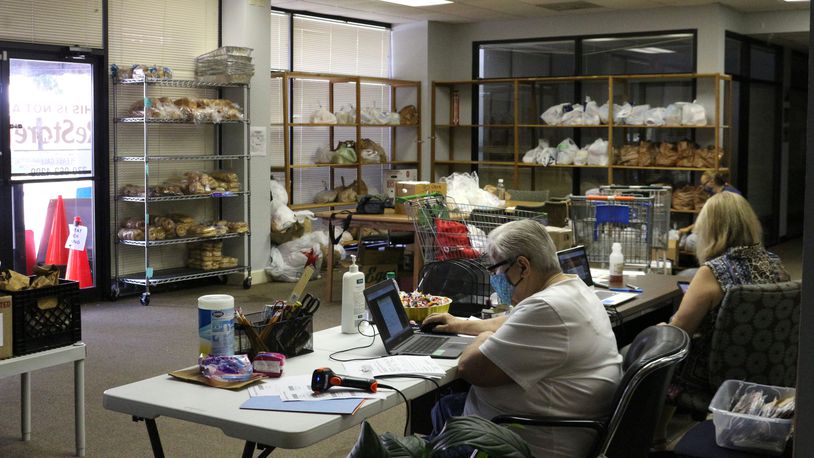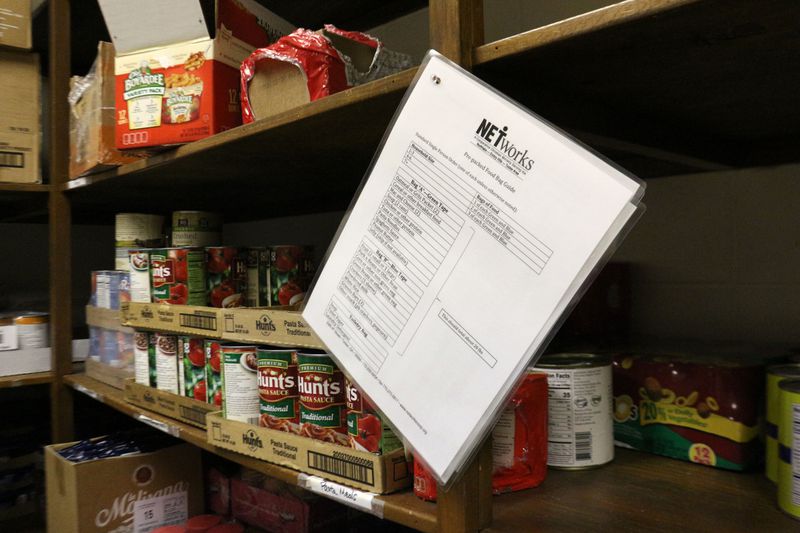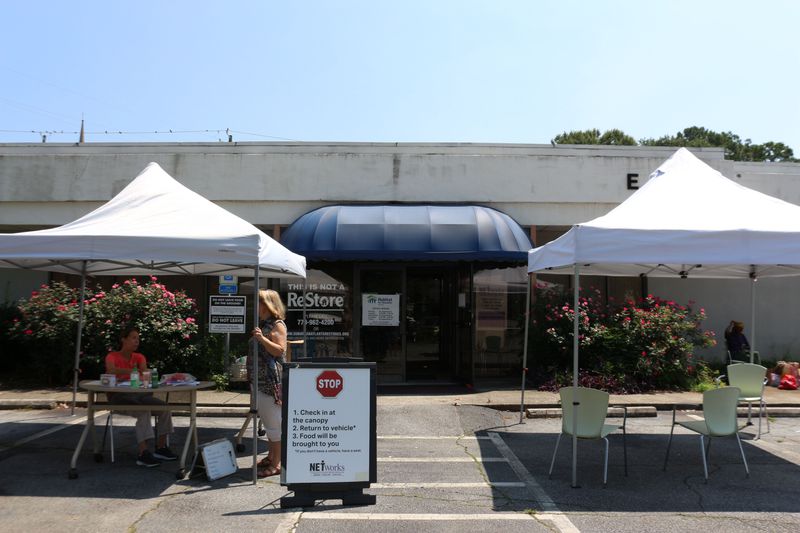
NETWorks Cooperative Ministry in downtown Tucker, provided emergency food assistance to local families three days per week throughout the pandemic. To prevent the spread of COVID-19, people checked in at a tent outside while volunteers filled a shopping cart with bags of non-perishable items and produce, when available. (William Newlin/UGA)
By AJC.com
They hope generosity continues as life slowly returns to normal
Metro Atlanta nonprofits witnessed an unprecedented surge in need in the past 18 months.
Two food assistance co-ops, the Southeast Gwinnett Cooperative Ministry in Grayson and NETWorks Cooperative Ministry in Tucker, hit record numbers of visitors to their food pantries.
MUST Ministries in Marietta served nearly six times as many people as usual.
And North Fulton Community Charities saw a 300% increase in requests for help.
“This has amplified stories about how many people live on the margins and how a significant portion don’t have $400 for emergencies,” said Milton Little Jr., president and CEO of United Way of Greater Atlanta.
“The fact that somebody can go from working to being on the food bank line overnight says a lot about the economic fragility of families and workers.”
Throughout the pandemic, nonprofits across the region dealt with an increased need and a deluge of support. Today, they’re taking stock of how they can help people get back on their feet – while hoping that the generosity they encountered during the pandemic continues.
Last year, U.S. charities received more than $471 billion – a 5.1% increase over 2019, according to Giving USA Foundation’s 2021 report. Human service organizations, including shelters, affordable housing groups and food service outfits, saw significant increases.
In Marietta, MUST Ministries is pushing forward with a $22 million capital campaign to build a new shelter space — increasing the number of beds from 72 to 136. If fundraising goes as planned, the group could move into its new home by early 2022.
“In uncertain times like the one we’re in, we don’t know if there’s going to be another shutdown or if we’ll be able to weather like we did last time,” said Dwight “Ike” Reighard, president and CEO of MUST.
“But if we pull together, we can help a lot more people in 2022 because people helped us.”
‘Numbers went up like crazy’
At NETWorks in Tucker, the nonprofit was accustomed to serving about 20 families during each of the nonprofit’s three service days. As the pandemic raged on, that number swelled to 40 households per day, Fisher said.
But the community pantry is in a better position now than it was in March 2020.
Since the pandemic began, NETWorks’ pool of donors has more than doubled. Much of the increased support came from individuals, with some donating stimulus checks.
The city of Tucker provided $780,000 to the organization through the CARES Act passed in March 2020, which went toward stocking food, providing rent, mortgage and utilities assistance and hiring temporary staff.

NETWorks Cooperative Ministry in downtown Tucker, provided emergency food assistance to local families three days per week throughout the pandemic. To prevent the spread of COVID-19, people checked in at a tent outside while volunteers filled a shopping cart with bags of non-perishable items and produce, when available. (William Newlin/UGA)
As people struggled to pay bills and buy food for their families, NETWorks increased its financial assistance payments by almost $800,000.
The scene was much the same at the Southeast Gwinnett Co-op.
The nonprofit accepted over $1 million more in cash donations and nearly 300,000 more pounds of food last year compared to 2019.
And the organization needed it.
“We were seeing people we’ve never seen,” said Director Laura Drake. “Our numbers went up like crazy — people from all walks of life, some of them we still have.”
A great need – and plenty of help
As Atlanta-area nonprofits implemented pandemic protocols, leaders and board members made decisions to dramatically shift operations, from implementing social-distancing guidelines to finding new ways to work with volunteers.
MUST Ministries, for instance, pared the organization’s offerings to focus on food and shelter. In a typical year, the ministry serves 33,000 individuals. In 2020, that number skyrocketed to 180,000.
With solid financial footing going into the pandemic, MUST’s board members decided to serve that need and built a $1 million deficit into the budget for the next fiscal year. Forced to cancel major in-person fundraising events, such as the 2020 Giving Gala and the Gobble Jog at Thanksgiving, the group had to look elsewhere for funding.
Fortunately for MUST, individual, government and company donations surpassed board members’ greatest expectations. Churches gifted funds to place people without housing in hotels to avoid COVID-19 exposure, and major grants brought in boxes of food that farmers typically supplied to restaurants.
“The only thing that was greater than the need,” Reighard said, “was the level of people’s generosity to step up to this.”
‘Last year was brutal’
While some nonprofits turned exceptional support into expanded services and facilities, other nonprofits worked to simply maintain their missions.
“Last year was brutal. It exacerbated all of the problems,” said Lisa Wise, executive director of Initiative for Affordable Housing in DeKalb County. “And that led to this conversation we’re having now about housing that’s affordable …”
Wise’s nonprofit manages four apartment complexes, offering reasonable rents to low-income families and seniors and providing free housing and support to people without homes. Even though contributions remained about average in 2020, more residents needed help.
Additional funding came from United Way and the Community Foundation for Greater Atlanta for emergency food and rental assistance. Wise said all of Initiative’s residents remained in their homes through 2020.
In Gwinnett County, three Habitat for Humanity houses were in progress when COVID-19 began to spread in Georgia. Work halted for 10 weeks while Habitat reset and introduced safety measures.
Executive Director Brent Bohanan said Habitat tapped into reserve funds to hire contractors. By May 2020, volunteers had returned, asking “When can we get back out? When are you going to open back up?”
“So, I’m just reminded of that and thankful that we have a mission that really inspires people to get behind it,” Bohanan said.
The windfall experienced by some metro Atlanta groups didn’t reach Habitat Gwinnett — grants and contributions have dipped slightly over the past two fiscal years. But funds from an ongoing capital campaign kept building on track in 2020, and Bohanan said 90% of pledged donations arrived on schedule despite pandemic-related interruptions.

NETWorks Cooperative Ministry in downtown Tucker, provided emergency food assistance to local families three days per week throughout the pandemic. To prevent the spread of COVID-19, people checked in at a tent outside while volunteers filled a shopping cart with bags of non-perishable items and produce, when available. (William Newlin/UGA)
Corporate volunteer groups who continue working from home haven’t returned to job sites yet, so Habitat Gwinnett plans to build fewer homes than average by year’s end.
What lies ahead?
When it comes to disaster relief, the largest amount of financial assistance typically goes to addressing the emergency itself. Afterward, however, people still need help.
And that’s the challenge that local nonprofits face.
“What’s going to be critical as we go forward is how do we help families, nonprofit organizations, neighborhoods and communities recover from this?” said Little, of theUnited Way of Greater Atlanta.
That includes broader societal questions around sustainable wages, equitable food distribution and a solid safety net for those who lack adequate access to education, health care and internet access. Just as the pandemic has disproportionately affected vulnerable groups and communities of color, the recovery process will likely be uneven as well.
“Communities that were disadvantaged at the front end, unless we do something different, are going to be disadvantaged at the back end,” Little said.
“Rather than rush back to normal and our normal rates of disparity, we need to be in a place to build on the lessons we’ve learned.”
MEET OUR PARTNER
Working closely with the American Press Institute, The Atlanta Journal-Constitution is embarking on an experiment to identify, nurture and expand a network of news partnerships across metro Atlanta and the state.
Today’s story comes from our newest partner, the Covering Poverty project, which is part of the Journalism Writing Lab, an initiative of the Cox Institute for Journalism Innovation, Management and Leadership at the University of Georgia.
This story and others will become part of an online toolkit, coveringpoverty.uga.edu, which is devoted to helping journalists across the country cover meaningful stories about people and poverty-related matters.
If you have any feedback or questions about our partnerships, you can contact Managing Editor Mark A. Waligore via email at [email protected].
Read the original story on AJC.com.











